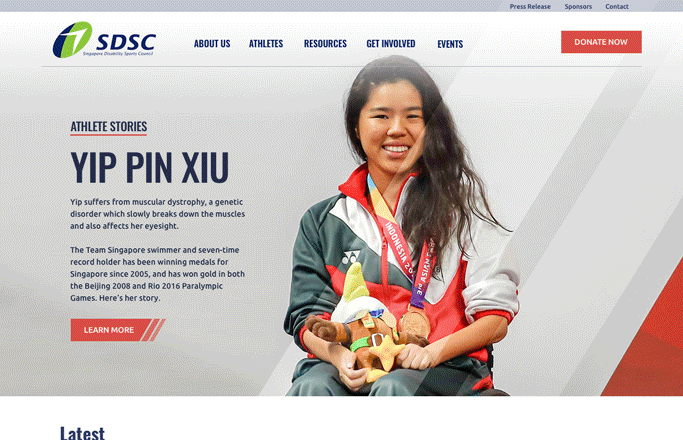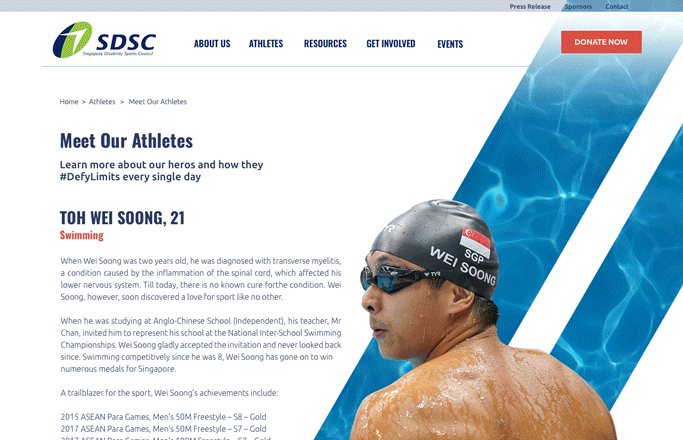SINGAPORE DISABILITY
SPORTS COUNCIL
This project is a proposed website redesign for Singapore Disability Sports Council (SDSC). The goal is to identify any usability issues with the current site and determine the critical features to prioritise for the next iteration of the design.
Role
Year
Platform
Timeline
Visual Design, Design System, Prototype
2 weeks
2020
Desktop

BACKGROUND
The SDSC is the national sports body for Persons with Disabilities (PwD), founded in 1973. It aims to transform the lives of PwD through sport as a form of rehabilitative therapy, and means to realise their potential. Besides providing platforms for learning sport, SDSC trains talents to represent Singapore at regional and international competitions.
SDSC is the only organisation that provides a range of sports and games for all persons with disabilities at both a recreation and competitive level. They rely on the generosity of supporters, donors and partners to sustain and grow their programmes.
In a team comprising of 2 other team members, we each took on the respective areas of Research, Design and Prototype to identify user needs to guide the overall design decisions, so we can improve the website experience through better information design and usability.

THE CHARITY CRISIS
In light of recent scandals, Singaporeans say they are less willing to donate to charity. More than half of Singapore surveyed indicated that the recent scandals surrounding charities have impacted their willingness to contribute.
36%
now donate lesser money to charity
16%
stopped donating
altogether
THE DESIGN CHALLENGE
Redesign the experience for prospective donors and volunteers, focusing on the way in which they can gain trust and learn more about the organization, so that the improved experience can pave the way for users to do a direct donation or register as a volunteer.
THE RESEARCH PROCESS
We conducted interviews and online research to develop our understanding of how the public interacts with non-profit organizations (NPO). A key insight was that it is important to understand how people came to choose their preferred NPO, and why.
Our journey included iterating and testing our redesigned site for usability and efficacy.
1. BENCHMARKS & ANALYSIS
To start with the research, we analysed 4 similar NPOs to understand what are the common and best-in-class features.
We learned that:
-
SDSC offers 4 modes of payment for donation compared to 1 or 2 modes among the other NPOs
-
SDSC and Disability Sports Australia (DSA) focus more on athletes achievement whereas the others are focus on their respective key initiatives
-
SDSC offers an email address to prospects to express their interest in volunteering, while 3 other NPOs uses a volunteer form page

2. USER INSIGHTS
To validate our assumptions, we conducted 10 interviews and identified who our relevant users are and came up with their goals, needs and motivations. This helped to shift our perspective from a features-first to a users-first mindset.
,,
I like to read inspiring stories on the NPO sites
,,
I get more assurance when the NPO maintains a good website
,,
I must resonate with the NPO’s mission and cause
,,
I like the flexibility in my commitment with the NPO
,,
I visit NPO sites with a purpose in mind - to donate or be a volunteer
,,
I conduct due diligence checks in the NPO before getting involved
,,
I think the credibility and legitimacy of the NPO is important
,,
I prefer the donation process to be as easy as possible


3. PERSONAS

AWARENESS
CONSIDERATIONS
DECISION
DANIEL
Casual conversation about donating to NPOs with friends after weekly soccer game and discovers SDSC through Google search
"How do I know if this NPO
is credible?"
VANESSA
Look for sign up page to be a volunteer
“How do I know if they will get back to me? Should I wait?”
LOW POINTS IN THE PERSONAS' JOURNEY

THE PROBLEM
Potential contributors need a veritable way to connect with our non-profit organization so that they can extend a helping hand with ease of mind
THE SOLUTION
By having an intuitive navigation and content-focused design, users will be able to access information and make informed decisions that can instill a sense of reliability, while focusing on the cause
INFORMATION ARCHITECTURE
As insights from the analysis shows that the disparity amongst NPO sites seems to lie in the local navigation section, we invited 21 participants to group cards of similar nature together so we can see as how subcategories are grouped under the global bar. The outcome allowed us to restructure the information intuitively and understand the relationship between items in the local navigation under the umbrella of the global navigation.

THE IDEATION PROCESS
We kickstarted the ideation process by conducting a design studio session among the team members. We got all of our ideas on paper and then we narrowed them down by eliminating the non-essentials and combining the best ideas into one concept. We had another round of review to gather feedback before I proceed to refine the designs.

STYLE GUIDE

Typography
Colors
Iconography
REDESIGNED HOMEPAGE
USABILITY TEST
We put 5 users to 3 tasks below and the feedback we got was extremely positive results during our first usability test. We did some minor iterations and concluded the second usability test with an astounding SUS score of 86, up 3.5 points from the first test.

Verify the authenticity as an NPO
“There were some charity scandals in the past, show us what you will do to allay those fears/ suspicions.”

Make a donation within 5 minutes
“Make a donation of S$25 to SDSC. Show us how you will complete this task.”

Register as a volunteer at webpage within 5 minutes
“You are interested to serve on a regular basis with SDSC. Show us how you will go about doing it.”



Verify the authenticity as an NPO
All the participants agreed there are sufficient information onsite to instil confidence and know more about the organisation. The success of this website relies very heavily on the users’ trust, in order for them to feel comfortable volunteering or contribute to the cause by donating. We want the design to perpetuate a sense of legitimacy and transparency while highlighting the athletes and their achievements.


The existing SDSC site has a section that allows users to access their Annual Reports and get to know more about the organization but the pages are quite text-intensive and lacking in visuals. So in this redesign, we included a more cohesive looking layout that emphasizes on large imagery.


Aside from fact-finding, our user insights also indicate a need to feel inspired and having a connection with the cause so we created a dedicated page for featured athletes, so that it also contributes to the authenticity as an NPO

Make a donation within 5 minutes

All participants completed the task and 4 of 5 of them mentioned their preferred payment method as PayNow and Bank Transfer as compared to Credit Card, with convenience and security being common factors of payment methods

All particpants completed the task and responded to the usage of filter bar positively.
As the current SDSC site does not provide volunteer form for users to register as a volunteer and prospects also have no access to information that can allow them to decide on their preferred commitment methods. With the redesign, users can filter the activities base on their needs and the detailed information provided can allow them to make more informed decisions

Register as a volunteer at webpage within 5 minutes
KEY TAKEAWAYS
During the course of the project, we noticed that the design of the website seemed to have changed hands many times over the years - a patchwork of needs and wants from different stakeholders. In this redesign, we turned the direction of the website towards the end-user by putting the focus on the athletes and users instead . Having a small agile team allowed us to move faster and we managed to introduce a significant number of improvements in the design that helped enhance the credibility of the site.

We also suggest further improving the site by focusing on the accessibility - As an inclusive NPO, SDSC is likely to see more users with disabilities visiting the site. Functionalities that can cater to such users may include the option to
-
Allow large text displays on screen
-
Invert screen colours
-
Audio edition - Read-to-you articles
SPECIAL THANKS
Team members:
Nicole Han - User Research
Ernesto Yeo - Information Architecture & Prototyping

